What do you think?
Rate this book


340 pages, Hardcover
Published December 31, 2018
The origins of money are thus grounded in the enterprise and specialization of labor in palaces and temples of Sumer and Babylonia.
Most fortunes throughout history have been obtained by appropriating the public domain and other land by military seizure, insider dealing, foreclosure by creditors, or purchase at distress prices – followed by a shedding of tax obligations. Ar some point this appropriation of land and natural resources reaches a high enough degree to enable the expropriators to become the de facto government.
The burden of debt tends to exceed the ability of debtors to pay. This has been the major cause of economic polarization from antiquity to modern times. Yet today's popular ideology blames debtors, as if when their arrears are a personal choice rather than stemming from economic strains that compel them to run up debts simply to survive.